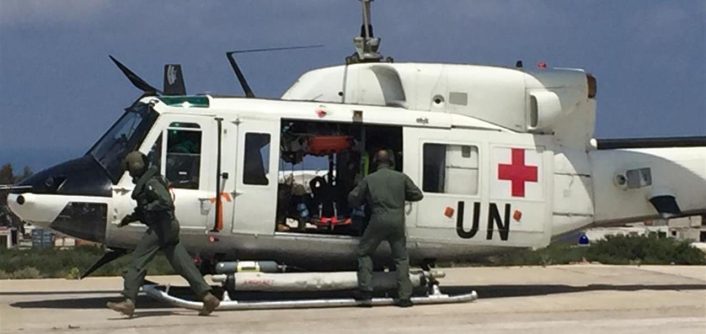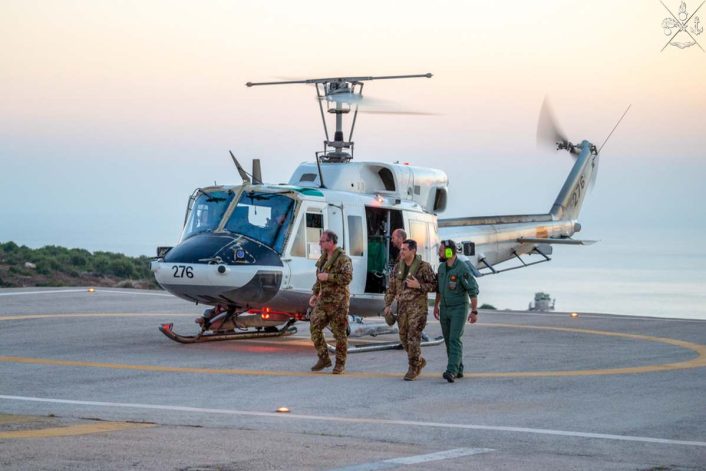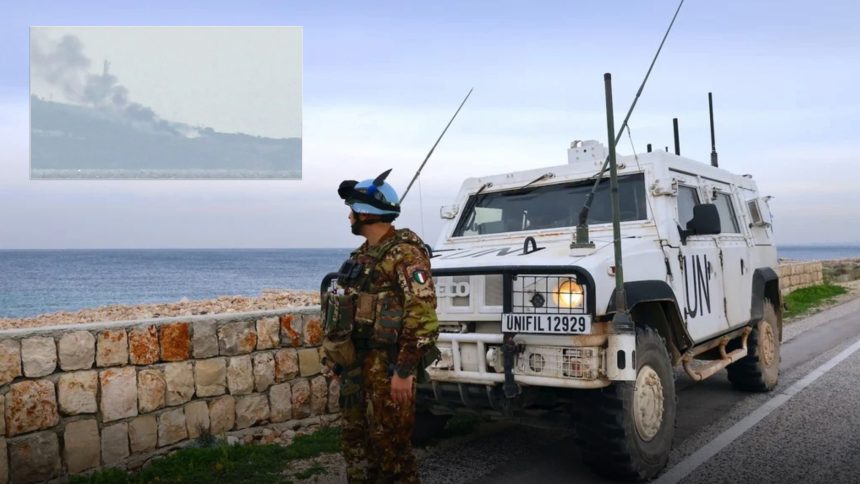Italy’s Defence Minister condemns Israeli attack on UNIFIL bases as “Intolerable” and “Not an Accident”.
Italy issued a formal protest to Israel on Thursday after attacks targeted the headquarters of the UNIFIL mission in Lebanon and two Italian bases. In response, Defense Minister Guido Crosetto summoned the Israeli ambassador to address the situation.
According to a UNIFIL spokesperson, two Indonesian peacekeepers were injured by Israeli Defense Forces (IDF) tank fire at an observation post, but none of the approximately 1,000 Italian soldiers involved in the UN mission were harmed.
Earlier, Hezbollah reported that it had struck an Israeli tank with guided missiles as it advanced toward Ras Naqoura. Following this, Hezbollah launched a missile barrage at an Israeli unit attempting to evacuate wounded soldiers from the area.

“The Italian government has formally lodged a protest with Israeli authorities, stressing that the situation around the UNIFIL base is unacceptable,” read a statement from Prime Minister Giorgia Meloni’s office. The statement followed her phone call with General Messina, commander of the Western Sector of the UNIFIL mission.
“As a result, the government, through the Defense Minister, summoned the Israeli Ambassador to Italy,” the statement added. Prime Minister Meloni, closely monitoring developments, has been in constant contact with Foreign Minister Antonio Tajani and Defense Minister Crosetto. She expressed strong solidarity, both personally and on behalf of the government, with the Italian troops serving in Lebanon as part of the UN and the bilateral MIBIL mission.
Meloni emphasized the vital role Italian forces play in stabilizing the region under the United Nations mandate, reaffirming the government’s commitment to supporting UNIFIL’s mission in southern Lebanon. Italy continues to work for the cessation of hostilities and the de-escalation of tensions in the area.
Defense Minister Crosetto also condemned the attacks, calling them “intolerable” and stressing the need to prevent further incidents. He stated, “I have lodged a protest with my Israeli counterpart and the Israeli ambassador.” Crosetto added that he had sent an official communication to the United Nations, reiterating Italy’s disapproval of the events in southern Lebanon and assuring full Italian cooperation in military efforts to de-escalate the situation and uphold international law.
“The safety of Italian troops in Lebanon remains a top priority for both myself and the Italian government. Their ongoing work supporting peace and stability in Lebanon and the wider region is crucial,” Crosetto concluded.
France has also stated that it is awaiting clarification from Israel after UNIFIL troops were targeted.
“France expresses deep concern over the Israeli strikes that hit the United Nations Interim Force in Lebanon [UNIFIL] and strongly condemns any attack on their safety,” the foreign ministry said in a statement. It also noted that none of its 700 soldiers in the mission were injured.
“We are expecting explanations from the Israeli authorities. The safety of peacekeepers is a responsibility that all parties involved in a conflict must uphold.”
UNIFIL mission
The UNIFIL mission was established by Resolution 425, adopted on March 19, 1978, by the United Nations Security Council following Israel’s invasion of Lebanon (March 1978).
Subsequent Resolutions have extended the mission’s mandate on a semi-annual basis.
After an attack on the Israeli Defense Forces (IDF) on July 12, 2006, south of the Blue Line near the Israeli village of Zar’it, carried out by Hezbollah elements, eight Israeli soldiers were killed, six were wounded, and two were captured by these militias.
When the request for their release was refused, Israel launched a military campaign in Lebanon aimed at eliminating Hezbollah militias and other armed elements. In response, Hezbollah militias conducted attacks on Israeli civilian infrastructure in northern Israel.
The escalation of hostilities led the IDF to carry out a large-scale military campaign north of the Blue Line against Hezbollah’s armed militias.

The hostilities lasted for 34 days, during which intense international diplomatic efforts were made to achieve a truce/ceasefire, with the goal of creating stable peace conditions. This culminated in Resolution 1701, adopted on August 11, 2006, which established the cessation of hostilities starting from Aug. 14, 2006.
Following the ceasefire, the IDF continued to occupy large areas of UNIFIL’s Area of Operations (AO), while Hezbollah and other armed elements remained in southern Lebanon.
During the days of conflict, the UNIFIL contingents from India and Ghana continued to occupy their positions in the AO, while from July 24, 2006, the four observation posts were abandoned by UN observers.
Since the start of the second phase of the UNIFIL mission (August 2006), an Italian General has been selected as the UNIFIL Head of Mission and Force Commander (HoM/FC) on four occasions.
ITALAIR
Originally called the “Italair Helicopter Squadron,” the ITALAIR Task Force unit was deployed near the town of Naqoura in southern Lebanon on July 3, 1979, in response to UN Security Council Resolutions 425/1978 and 426/1978, which led to the creation of UNIFIL. The mission’s mandate was to restore peace, international security, and assist the Lebanese government in regaining effective control over its territory.
Following the escalation of the 2006 conflict between Lebanon and Israel, the United Nations expanded UNIFIL’s responsibilities with Resolution 1701, broadening its mandate to monitor the cessation of hostilities between the two countries, assist the Lebanese Armed Forces, and support the local population. Italair is an inter-service unit that currently operates AB 412 and AB-212 (HH-412 and UH-212) helicopters of the Italian Army Aviation, based at the 2nd AVES “Sirio” Regiment in Lamezia Terme. It includes flight crews and support personnel primarily from the Italian Army, with additional contributions from the Navy and Air Force.
Italair is the longest-serving unit of the Italian Armed Forces in international missions. It continuously supports UN operations in Lebanon with two AB-412 and four AB-212 helicopters, providing 24/7 medical evacuations (CASEVAC/MEDEVAC), with one helicopter always on 30-minute standby, day and night. The unit also conducts firefighting in forest and rural areas, logistical transport, aerial patrols along the 120-kilometer “Blue Line” that separates Lebanon from Israel, and search-and-rescue operations in the event of public disasters. In 45 years, Italair has flown approximately 46,614 hours, transported over 186,577 passengers, and carried out 1,424 medical evacuations.
The unit suffered one loss on Aug. 6, 1997, when an AB205, UN 281, crashed claiming the lives of three crew members (two pilots, Major Antonino Sgrò and Maj. Giuseppe Parisi, and technical specialist First Marshal Massimo Gatti of the Italian Army) and two passengers (Carabinieri Brigadier Daniel Forner and Irish Sergeant John Lynch).










